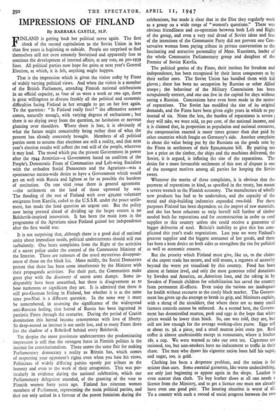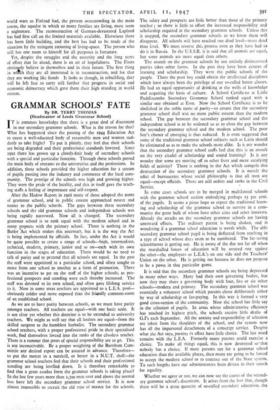IMPRESSIONS OF FINLAND
By BARBARA CASTLE, M.P. FINLAND is getting back her political nerve again. The first shock of the second capitulation to the Soviet Union in less than five years is beginning to subside. People are surprised to find themselves still not even remotely Sovietised and apparently free to continue the development of internal affairs, at any rate, on pre-1939 lines. All political parties now hope for gains at next year's General Election, at which, it is felt, anything might happen.
That is the impression which is given the visitor today by Finns of widely varying political views. And when the visitor is a member of the British Parliament, attending Finnish national celebrations in an official capacity, as four of us were a week or two ago, there is great willingness to discuss frankly all the political and economic difficulties facing Finland in her struggle to get on her feet again. To the question: "Is Finland really free? " the affirmative answer comes, naturally enough, with varying degrees of enthusiasm ; but there is no shying away from the question, no hesitation or nervous glancing over shoulders. Where there is fear, it is obviously of what the future might conceivably bring rather than of what the present has already concretely brought. Members of all political parties seem to assume that elections are still a reality, and that next year's election results will reflect the real will of the people, wherever it may lead. The mood which put the present Government in power after the 1944 Armistice—a Government based on coalition of the People's Democratic Front of Communists and Left-wing Socialists with the orthodox Social Democrats and the Agrarians—was a spontaneous nation-wide desire to have a Government which would get on well with Russia and lighten as far as possible the burdens of restitution. On one vital _issue there is general agreement —the settlement on the land of those uprooted by war. The flooding of the rest of Finland with over 450,000 voluntary emigrants from Karelia, ceded to the U.S.S.R. under the peace settle- ment, has made the land question an urgent one. But the policy now being pressed ahead of dividing up the larger estates is no Bolshevik-inspired innovation. It has been the main item in the programme of the Agrarians since Finland gained her independence after the first world war.
It is not surprising that, although there is a good deal of national unity about immediate needs, political undercurrents should still run turbulently. One hears complaints from the Right of the activities of a secret police under the control of the Communist Minister of , the Interior. There are rumours of the usual mysterious disappear- ances of those on the black list. More mildly, the Social Democrats protest that there has been some interference by the Minister with their propaganda activities. For their part, the Communists make great play with the discovery of secret arms dumps. Some in- disputably have been unearthed, but there is disagreement as to how numerous or significant they are. It is admitted that there is still pro-German fe-eling in Finland, but whether it is at the same time pro-Nazi is a different questicn. In the same way it must be remembered, in assessing the significance of the widespread anti-Russian feeling, that hatred of Russia has been ingrained in patriotic Finns through the centuries. During the period of Czarist domination this hatred became synonymous with love of liberty. So deep-rooted an instinct is not easily lost, and to many Finns there lies the shadow of a Bobrikoff behind every Bolshevik.
Yet despite the more passionate undercurrents the predominating impression is still that the strongest force in Finnish politics is the instinct for constitutionalism. There seems the same flair for making Parliamentary democracy a reality as Britain has, which comes of respecting your opponent's rights even when you hate his views. Politicians of widely differing parties openly pay tribute to the honesty and even to the work of their antagonists. This was par- ticularly in evidence during the national celebration, which our Parliamentary delegation attended, of the granting of the vote to Finnish women forty years ago. Finland has nineteen women members of Parliament, representing the main political parties, and they not only united in a fervour of the purest feminism during the
celebrations, but made it clear that in the Diet they regularly work as a group on a wide range of "women's questions." There was obvious friendliness and co-operation between both Left and Right of the group, and even a very real dread of Soviet ideas and fear of the intentions of the Communist Party did not prevent one Con- servative woman from paying tribute in private conversation to the fascinating and attractive personality of Mme. Kuusinen, leader of the whole Communist Parliamentary group and daughter of the Premier of Soviet Karelia.
The political genius of the Finns, their instinct for freedom and independence, has been recognised by their latest conquerors as by their earlier ones. The Soviet Union has handled them with kid gloves ; there has been no occupation by Russian or other Allied troops ; the behaviour of the Military Commission has been scrupulously correct, and one can live in the capital for days without seeing a Russian. Concessions have even been made in the matter of reparations. The Soviet has modified the size of its original demands, and the Finns have been given eight years in which to pay instead of six. None the less, the burden of reparations is severe ; they will take, we were told, to per cent, of the national income, and it is claimed that, in proportion to population and national resources, the compensation exacted is many times greater than that paid by other countries which fought on Germany's side. Another complaint is about the value being put by the Russians on the goods sent by
the Finns in settlement of their $300,00o,000 bill. By putting too low a price on the timber, the ships and the machines delivered, the
Soviet, it is argued, is inflating the size of the reparations. The desire for a more favourable settlement of this sort of dispute is one of the strongest motives among all parties for keeping the Soviet sweet.
Whatever the merits of these complaints, it is obvious that the payment of reparations in kind, as specified in the treaty, has meant a severe wrench to the Finnish economy. The manufacture of wholly new products has had to be undertaken, and the capacity of the metal and ship-building industries expanded two-fold. For these purposes Finland has been dependent on the import of raw materials, and she has been reluctant to strip herself still further of timber needed both for reparations and for reconstruction in order to send supplies to this country unless she could receive a guarantee of bigger deliveries of steel. Britain's inability to give this has com- plicated this year's trade negotiations. Last year we were Finland's greatest supplier and the biggest consumer of her goods, and there has been a keen desire on both sides to strengthen the ties for political as well as economic reasons.
But the priority which Finland must give, like us, to the claims of the export trade has meant, and still means, a regimen of austerity beyond the worst yet visualised by this country. Food has been almost at famine level, and only the most generous relief donations
by Sweden and America, an „American loan, and the taking in by Sweden of Finnish children for rehabilitation has saved the country
from- permanent ill-effects. Even today the 'rations are inadequate for health without recourse to the costly black market. The Govern- ment has given up the attempt to break its grip, and Ministers explain, with a shrug of the shoulders, that where there are so many small farmers controls cannot be enforced. As a second best, the Govern- ment has decontrolled mutton, pork and eggs in the hope that white prices would be lower than black. So, one was told, they are, but still not low enough for the average working-class purse. Eggs sell at about Is. 3d. a piece, and a small mutton joint costs 30s. Real coffee is almost unobtainable except in restaurants, where it fetches as. a cup. We were warned to take our own tea. Cigarettes are rationed, too, but non-smokers have no inducement to traffic in their share. The man who draws his cigarette ration loses half his sugar, and sugar, too, is gold.
Clothing, has been a desperate problem, and the ration is far stricter than ours. Some essential garments, like warm underclothing, are only just beginning to appear again in the shops. Leather is even scarcer than cloth. To buy leather shoes at all one needs a licence from the Ministry, and to get a licence one must not already have even one good pair. The housing situation is worst of all. To a country with such a record of social progress between the two
world wars as Finland had, the present overcrowding in the main towns, the squalor in which so many families are living, must seem a nightmare. The reconstruction of German-devastated Lapland has had first call on the limited materials available. Elsewhere there has been little building, and the best has had to be made of the situation by the stringent rationing of living-space. The person who still has one room to himself for all purposes is fortunate.
Yet, despite the struggles and the austerity and the long years of effort that lie ahead, there is an air of hopefulness. The Finns obviously believe in themselves and in their future. The first thing in whiPch they are all interested is in reconstruction, and for that they are working like fiends It looks as though, in rebuilding, they will be left free to carry still further that progress in social and economic deinocracy which gave them their high standing in world esteem.



































 Previous page
Previous page